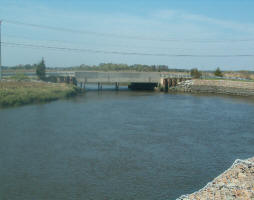 Stakeholder Participatory Sustainable Water Management at Farm Level Cooperation with Jordan and Palestine
Stakeholder Participatory Sustainable Water Management at Farm Level Cooperation with Jordan and Palestine
- The irrigation system in Jordan and Palestine is strongly impaired due to
a lack of socio-economic, cultural and technological means. Some of the
greatest problems are: the inefficient and ineffective water management of
national water resources, outdated and partly leaking water networks, bad
water quality, inefficient irrigation networks, limited quantities of water
per household and a lack of general awareness regarding the optimal
use of limited water resources.
- Apart from the well-coordinated technical improvement of water
quality and irrigation management, it is vital to create a fundamental
and systematic improvement of relations between the individual interest
groups at municipal and local level in Jordan and Palestine.
- Because of the conflicting interests of irrigation suppliers and farmers, external intervention is necessary in order to adjust these relations and introduce an institutionalised communication process.
- Another problem in current relations between interest groups is the condition of women in agriculture. Although women carry out most of the agricultural work, they are not included in decisions and educational facilities. This is partly due to traditional roles and the lack of technical training. Local NGOs have set up initiatives that aim to support and give value to the women, but it is not part of national policy or in any way seen as a priority.
| Project number | n/a | ||
|---|---|---|---|
| Subject(s) | WATER DEMAND , no translation available , DRINKING WATER AND SANITATION : COMMON PROCESSES OF PURIFICATION AND TREATMENT , no translation available | ||
| Acronym | MEDWA | ||
| Geographical coverage | Austria, Spain, Palestine, Jordan | ||
| Budget (in €) | 5493825 | ||
| Programme | MEDA-WATER | ||
| Web site | http://www.medwa.org/ | ||
| Objectives | - The MEDWA project connects two approaches – one socio-economic
and the other technical – for the solution of the multilayered problems
of water management in Jordan. The aim is the complete and sustainable
improvement of the regional development.
-The project starts with the definition and systematic inclusion
of local/regional and national interest groups. It then seeks
to establish a know-how and technology base for further
implementation in technical and non-technical training, as well as to
demonstrate and pilot activities and equipment (irrigation
networks, collective wastewater treatment, construction of common and
individual reservoirs and cisterns, rehabilitation of production wells,
etc.).
|
||
| Results | Examples of efficient water supply management activities:
- In parallel, organisational structures are created (associations, cooperations, forums) with institutionalised strategic interfaces. These structures shall not only act as committees for the exchange of opinions, experiences or tested training models on a micro-economic level, but will also strengthen the capacities of interest groups and municipalities. Women should play a decisive role in these organisations. - The marriage of technical “hardware” and socio-economic “software” is a direct solution to the complexity of the problem and aims at sustainable improvement of regional development. |
||
| Period | [18/04/2004 - 01/05/2007] | ||
 you are not logged in
you are not logged in





